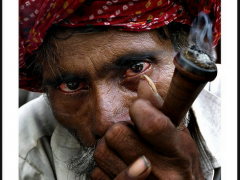To Prevent or not to Prevent – that is the Question in Pakistan

As fatality from non-communicable diseases rises in Pakistan, the importance of prevention of such diseases as opposed to treatment is evaluated.
The World Health Organization considers smoking to be a global disease. The prevalence and subsequent deadly effect of smoking in some regions of the world however is much greater than others. This can be seen as non-communicable diseases (NCDs) such as chronic bronchitis, lung cancer and emphysema are now more prevalent in developing and underdeveloped countries then ever before due to increased popularity of smoking. However that’s just the tip of the iceberg other NCDs such as those of the cardiovascular system linked to smoking are also increasing hands fold. In Pakistan, 40% of men and 12% of women smoke. Each day, 1200 young boys take up smoking as well as many young girls – substantiating WHOs declaration, leading to more disease risks and overall weakening an already cripple national health system.
To further add to the problem, other non-communicable diseases (NCDs) are also targeting the masses and are more often causing fatality. These diseases which demand long term medical attention through administered drugs, routine check ups and hospital admissions not only put a physical strain on the sufferers and their families but also a financial and psychological strain on them. To top it off the public health facilities – the few that are present to cater to a population of 180 million, are not equipped well enough to deal with such diseases effectively. NCDs which may be dealt with ease in the first world are sometimes impossible to treat in the third world. Thus it is no surprise seeing patients whose deaths are preventable lose their lives to an ineffective health system in Pakistan.
But all is not grim and we can (if we choose to) take measures to change this scenario. In terms of countering the rise of NCDs and increasing the life expectancy of its sufferers – we can look upon two aspects:
- The first of which is improving the national health care system so that public hospitals are outfitted with well trained staff and up-to-date equipment that can deal with these diseases effectively. Although this process demands high cost but the capital needed can be generated by prioritizing the health of the nation and redirecting national budget funds from the less important areas. This is however an unlikely step that will be taken by debt drowned undeveloped nations. Nor would it be a feasible step given the circumstances and the widespread of non-communicable diseases in the nation.
- So let’s move to the other aspect of countering NCDs that is much more suitable for countries like Pakistan, countries that have low GDP and are in high debt. This involves us dealing with said diseases with the help of preventive measures and through changes in our lifestyle. Non-communicable diseases are unique in the way as the factors which lead up to a person suffering from an NCD are to a major extent avoidable. The root of NCDs such as obstructive pulmonary disease, diabetes and cardiovascular diseases can all be prevented and sometimes even lowered through the adoption of a healthier lifestyle. Exercising, giving up smoking, eating less saturated fat, losing weight have all shown through epidemiological evidence to drastically reduce the risks of developing NCDs.
Thus when it comes to Pakistan the only logical way to raise the health standards of the masses and reduce fatality by non-communicable diseases is through large scale awareness programs. This is also highly emphasized in NAP (The National Action Plan on NCDs) which comprises of a detailed study on the prevention and control of non-communicable diseases and health promotion in Pakistan.
“As stated in NAP Addressing NCDs in a developing country such as Pakistan is a multidimensional challenge with implications at different levels. Lobbying for appropriate investments and policies to facilitate the inclusion of the prevention of NCDs as part of the global development and health agenda is a critical aspect of the issue.”
In light of the conclusion of the National Action Plan and through our own better judgment we must look to include institutional, community and public policy level changes that promote awareness and prevention of NCDs in Pakistan. Not only is this the only way we can lower the death threat posed by NCDs but it is also the most cost friendly way for developing and underdeveloped nations.
Tags: Health, National Action Plan (NAP), non-communicable diseases, Preventable disease, Treatment

